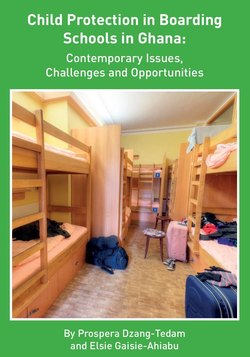Читать книгу Child Protection in Boarding Schools in Ghana - Prospera Dzang-Tedam - Страница 13
На сайте Литреса книга снята с продажи.
ОглавлениеChapter 6Education in Ghana
The Ministry of Education (MoE), through the Ghana Education Service (GES), is responsible for all formal and non-formal education, including Early Childhood Care and Development (ECCD) for children over the age of five. The government’s commitment to education is enshrined in the 1992 Constitution, which guarantees that basic education shall be free, compulsory and available to all, and that secondary and higher education shall be made generally available. Basic education in Ghana comprises two years of kindergarten, six years of primary and three years of junior secondary school making a total of eleven years (UNICEF 2011). There have been many changes over the last 20 years to the education system in Ghana which has been argued by some to be both a blessing and a curse, receiving mixed reactions from its citizens.
A major concern highlighted by the UN Committee on the Rights of the Child is the widespread use of corporal punishment in schools. A recent study conducted with UNICEF support found that 94 percent of surveyed school children either experienced or witnessed corporal punishment in school. Such a finding gives impetus for the consideration of employing social workers in schools.
Addai-Mununkum (2014) outlines the development of religious education in Ghana and focusses on the changes which newer reforms to education brought (6 changes between 1920 and 2002) largely because stakeholders did not want to be accused of prioritising any one religion/faith over another.
Age and Education in Ghana
It is important to highlight the relevance of age within the context of childhood, education and educational opportunities in Ghana.
Unlike many European countries, Ghana historically did not provide education based on age-related characteristics. Apart from the fact that this was difficult to do logistically and practically, access to education was also seen as a decision to be made by the family and not an imposition by governments and/or educational institutions. Such a situation provides a rationale for the difference in approaches to education and access in Ghana and indeed most of sub-Saharan Africa. Dunne and Ananga (2013) found that in some rural communities in Ghana, children as old as 8 or 9 years enrolled into Class 1 (Year 1) of primary school. Indeed, the decision for a family to enrol their child in school is taken alongside a range of other considerations. Consequently, the discussion about what constitutes childhood is crucial to understanding the systems for protecting children in boarding schools. If we are to go by the UNCRC’s definition of a child as being under 18 years of age, what are the implications for people who are 18 and above and who have been placed in dormitories with much younger children (aged 11-14)? This requires urgent reconsideration and ongoing scrutiny. In addition, do younger children in boarding school environments have more protection than older children from staff and policies? If so, how and why?
It may not be immediately apparent to stakeholders for the need to ensure safety of younger children in this context. Here we propose a strategy which could further assist in safeguarding younger children in the boarding facility. This is not to say that older children aged 17/18 do not require safeguarding and child protection processes, however it does illuminate the need for a different type of process. With the current set up, it may be that ‘children’ (using the UNCRC and legal definitions) are in the same facility as ‘adults’. Government and educational institutions are asked to consider how this might pose difficulties for them in terms of protecting children, and when formulating processes and systems, how are these factors taken into account?
Glozah and Pevalin (2016) found that in some cases, the presence of ‘adults’ (18 years and above) in senior high schools was apparent. This they argued may be due to several reasons: a late start in school, poor academic performance, interruptions (stop-start), early pregnancies, inability to pay fees or class repetition.
Learning checks
What have you learned from this chapter?
What did you know before?
